2013版初中英语全程复习方略课件(教材复习案)八年级下册 Units 9、10(人教版)(共57张PPT)
文档属性
| 名称 | 2013版初中英语全程复习方略课件(教材复习案)八年级下册 Units 9、10(人教版)(共57张PPT) | 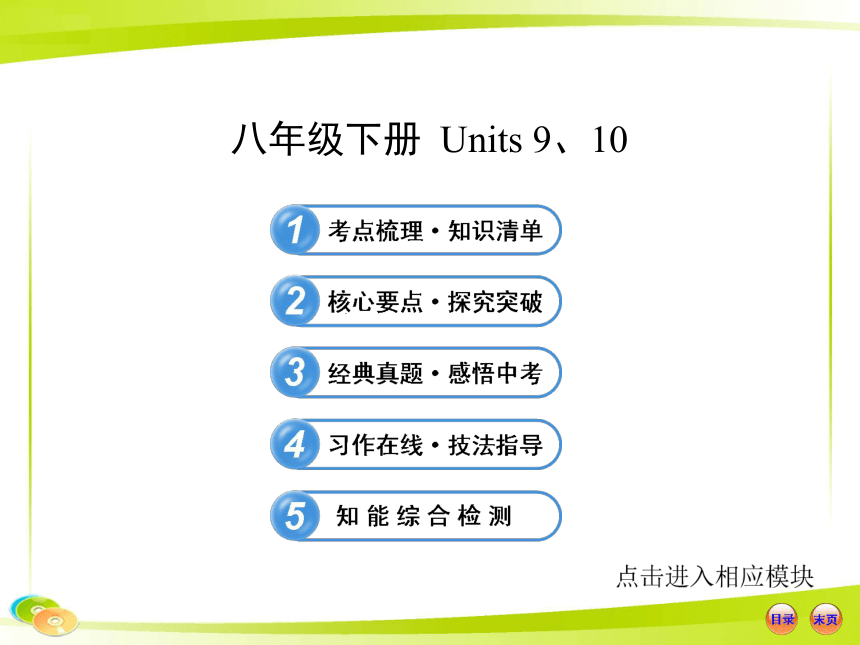 | |
| 格式 | zip | ||
| 文件大小 | 1.0MB | ||
| 资源类型 | 教案 | ||
| 版本资源 | 人教新目标(Go for it)版 | ||
| 科目 | 英语 | ||
| 更新时间 | 2014-03-06 21:55:07 | ||
图片预览

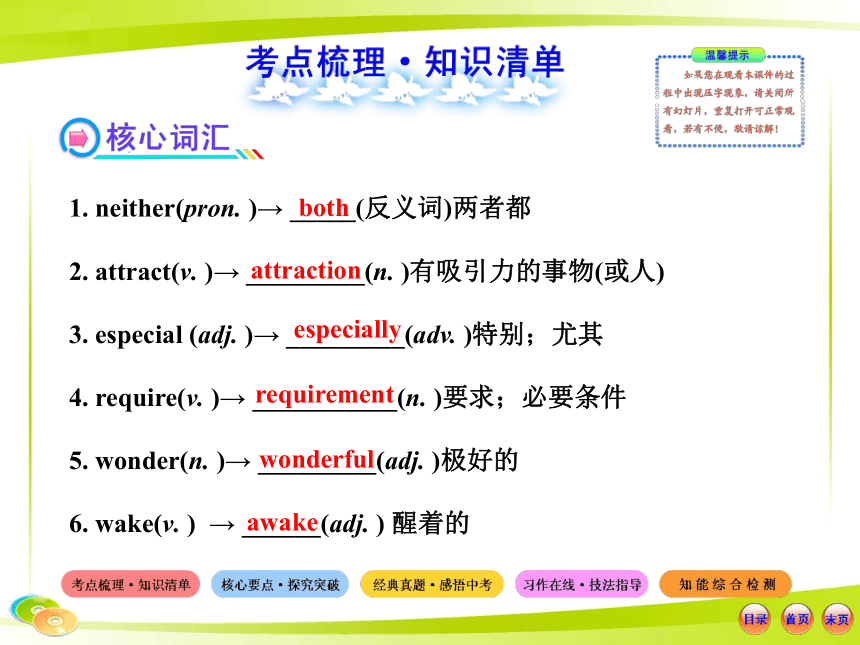
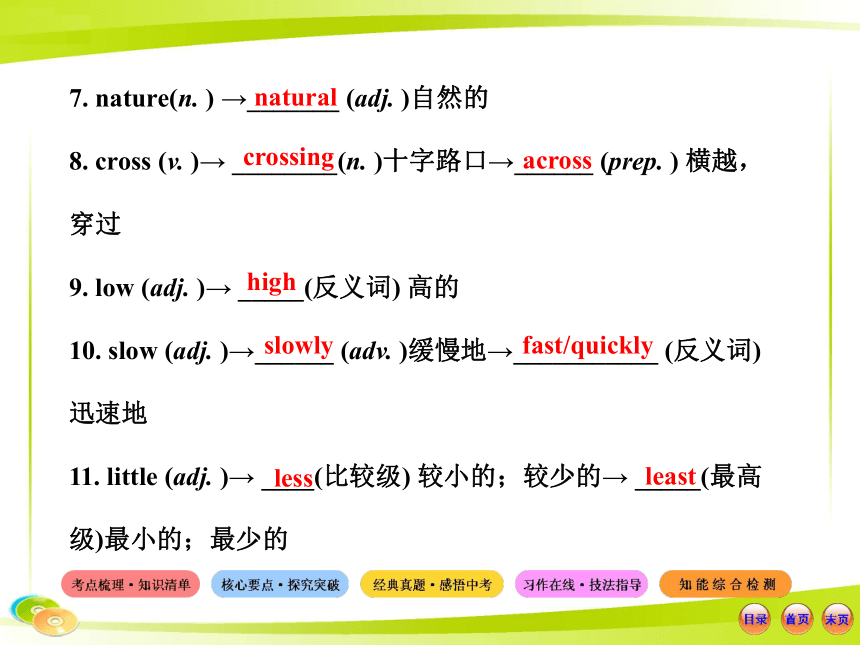
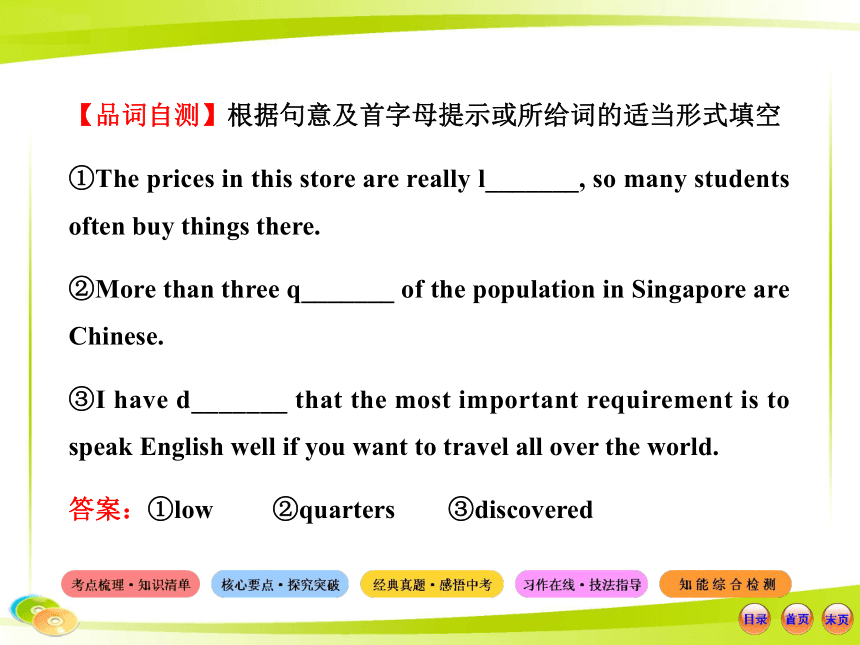
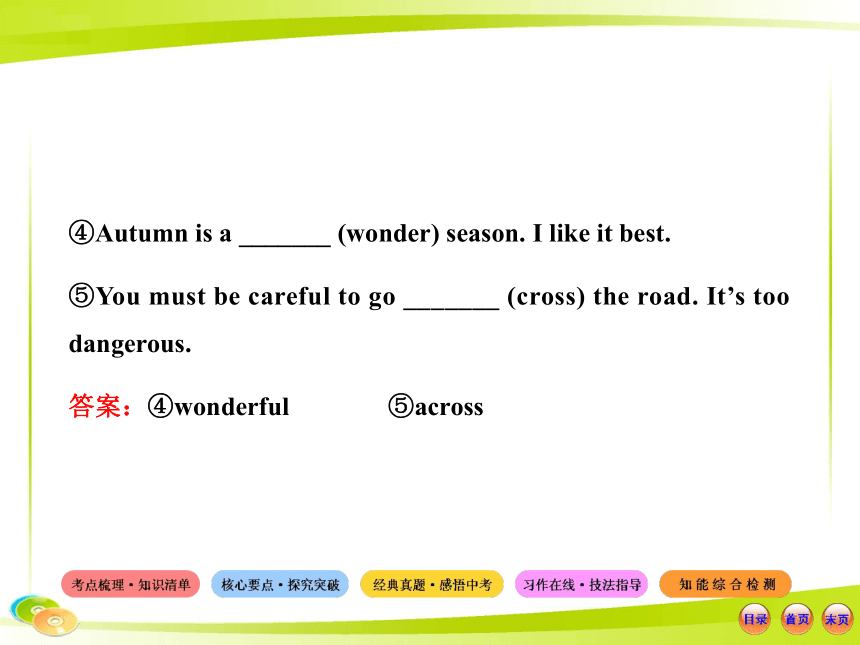
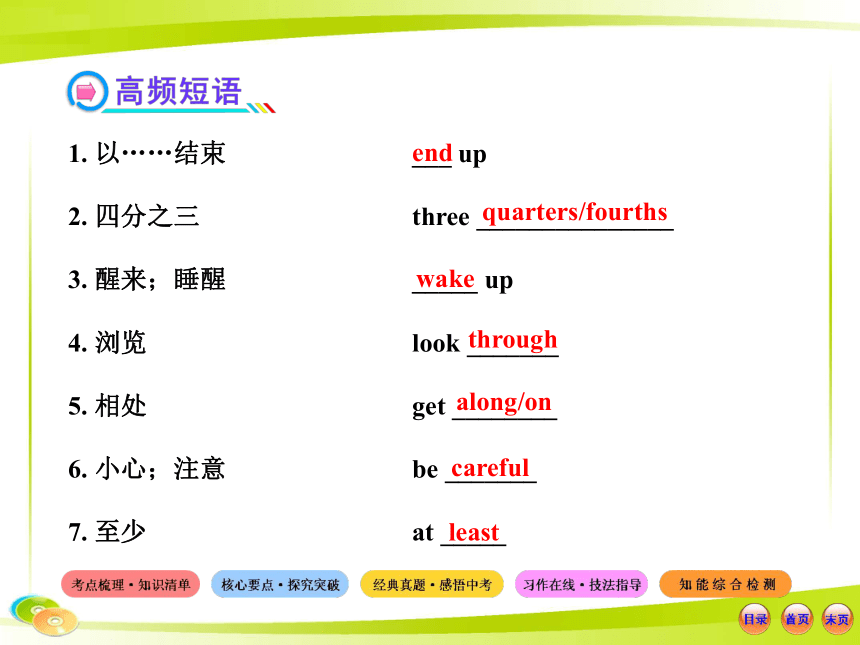
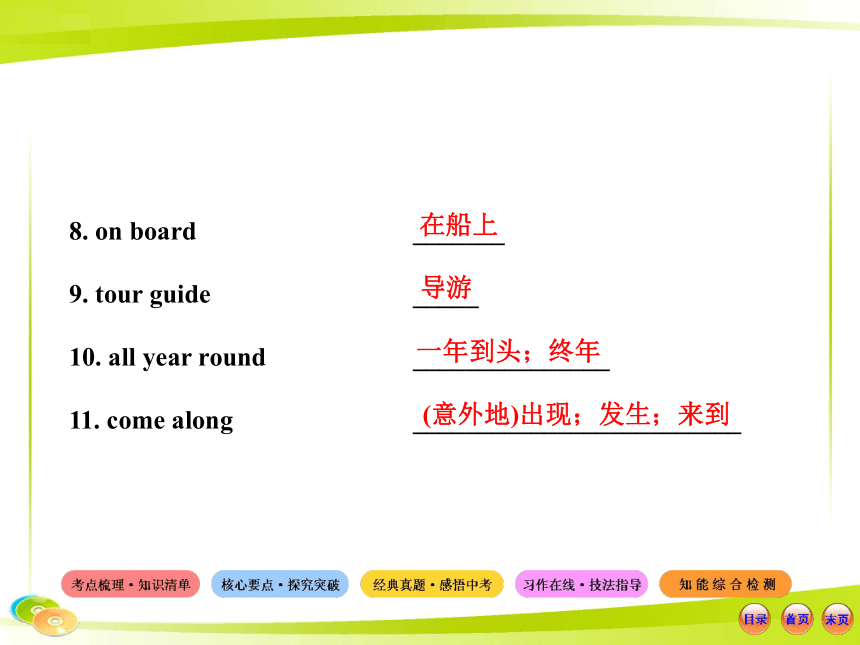
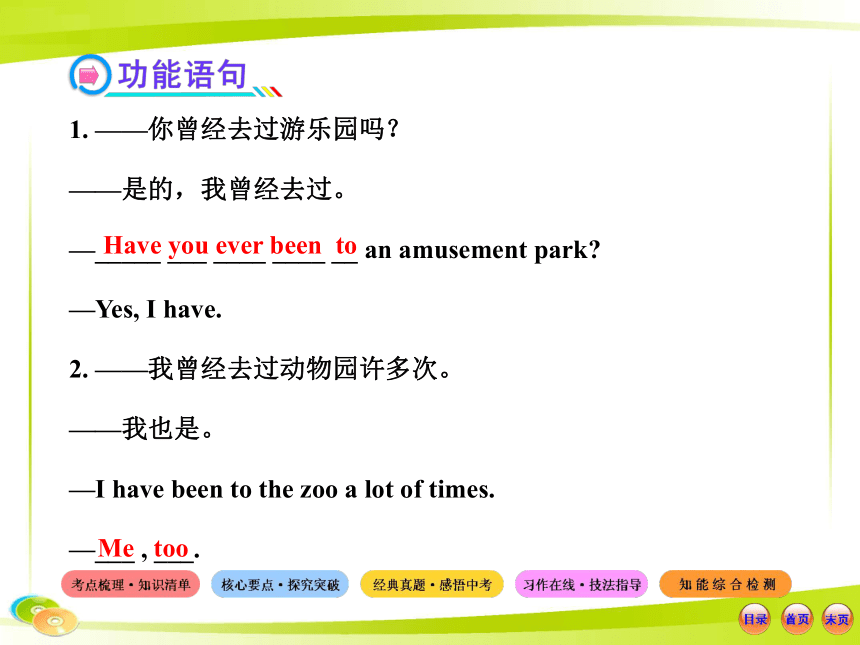
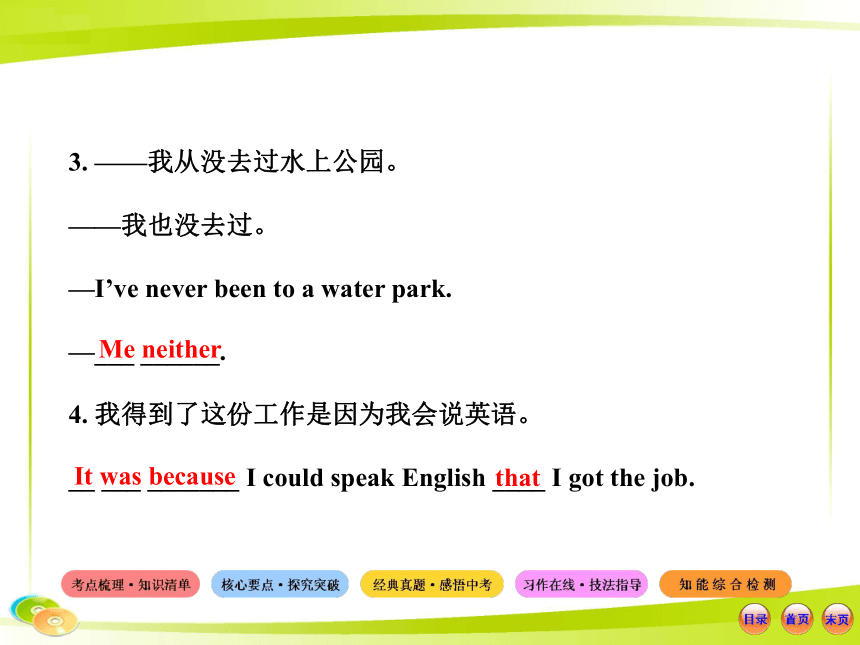
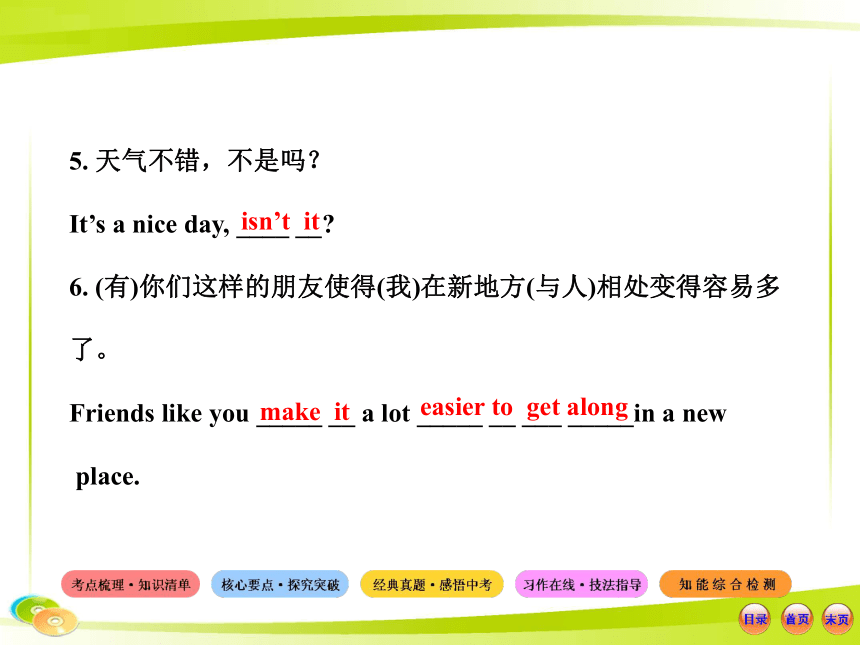
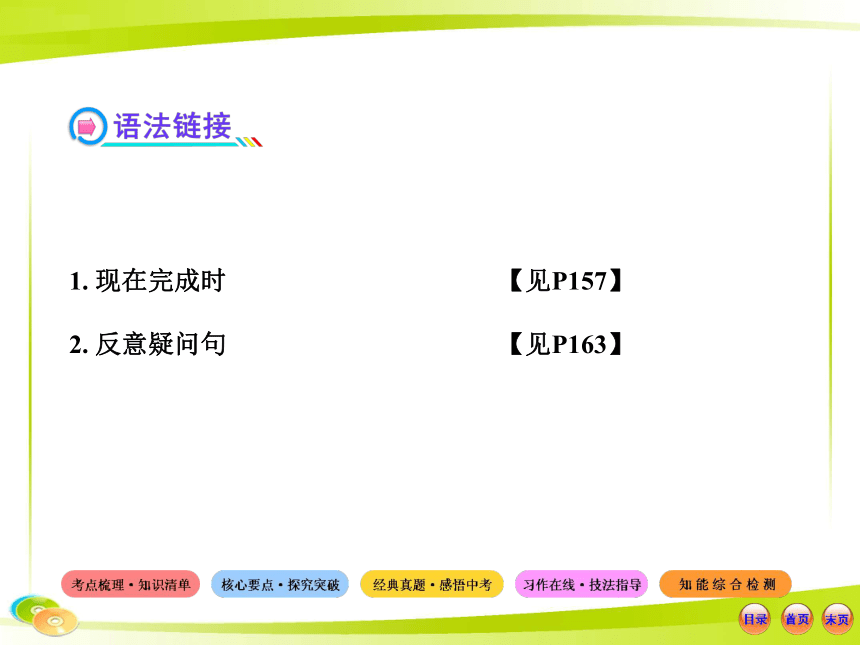
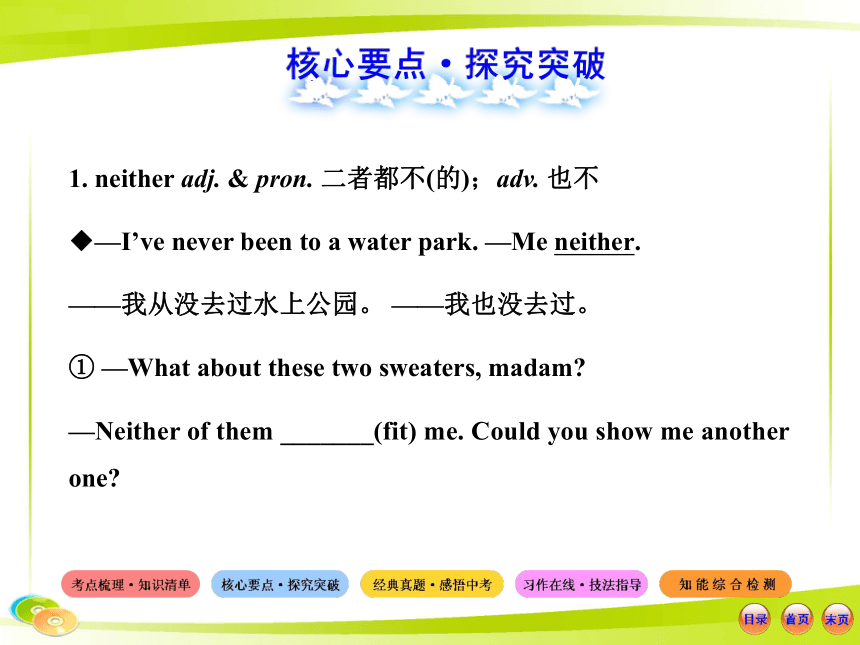
文档简介
(共57张PPT)
八年级下册 Units 9、10
1. neither(pron. )→ _____(反义词)两者都
2. attract(v. )→ _________(n. )有吸引力的事物(或人)
3. especial (adj. )→ _________(adv. )特别;尤其
4. require(v. )→ ___________(n. )要求;必要条件
5. wonder(n. )→ _________(adj. )极好的
6. wake(v. ) → ______(adj. ) 醒着的
both
attraction
especially
requirement
wonderful
awake
7. nature(n. ) →_______ (adj. )自然的
8. cross (v. )→ ________(n. )十字路口→______ (prep. ) 横越,
穿过
9. low (adj. )→ _____(反义词) 高的
10. slow (adj. )→______ (adv. )缓慢地→___________ (反义词)
迅速地
11. little (adj. )→ ____(比较级) 较小的;较少的→ _____(最高
级)最小的;最少的
natural
crossing
across
high
slowly
fast/quickly
less
least
【品词自测】根据句意及首字母提示或所给词的适当形式填空
①The prices in this store are really l_______, so many students often buy things there.
②More than three q_______ of the population in Singapore are Chinese.
③I have d_______ that the most important requirement is to speak English well if you want to travel all over the world.
答案:①low ②quarters ③discovered
④Autumn is a _______ (wonder) season. I like it best.
⑤You must be careful to go _______ (cross) the road. It’s too dangerous.
答案:④wonderful ⑤across
1. 以……结束 ___ up
2. 四分之三 three _______________
3. 醒来;睡醒 _____ up
4. 浏览 look _______
5. 相处 get ________
6. 小心;注意 be _______
7. 至少 at _____
end
quarters/fourths
wake
through
along/on
careful
least
8. on board _______
9. tour guide _____
10. all year round _______________
11. come along _________________________
在船上
导游
一年到头;终年
(意外地)出现;发生;来到
1. ——你曾经去过游乐园吗?
——是的,我曾经去过。
—_____ ___ ____ ____ __ an amusement park
—Yes, I have.
2. ——我曾经去过动物园许多次。
——我也是。
—I have been to the zoo a lot of times.
—___ , ___.
Have you ever been to
Me too
3. ——我从没去过水上公园。
——我也没去过。
—I’ve never been to a water park.
—___ ______.
4. 我得到了这份工作是因为我会说英语。
__ ___ _______ I could speak English ____ I got the job.
Me neither
It was because
that
5. 天气不错,不是吗?
It’s a nice day, ____ __
6. (有)你们这样的朋友使得(我)在新地方(与人)相处变得容易多
了。
Friends like you _____ __ a lot _____ __ ___ _____in a new
place.
isn’t it
make it
easier to get along
1. 现在完成时 【见P157】
2. 反意疑问句 【见P163】
1. neither adj. & pron. 二者都不(的);adv. 也不
◆—I’ve never been to a water park. —Me neither.
——我从没去过水上公园。 ——我也没去过。
① —What about these two sweaters, madam
—Neither of them _______(fit) me. Could you show me another one
② Both his parents and he have heard about the program before. (改为否定句)
_______ his parents _______ he _______ heard about the program before.
③—I haven’t been to a water park.
—_______.
A. So have I B. So has I
C. Neither have I D. Neither has I
④Neither my friends nor I _______ (be) interested in the action movies.
【自主归纳】neither的用法总结:
形容词 (1)用在单数名词之前
(2)其修饰的词作主语时,谓语动词用单数
Neither answer is right.
两个答案都不对。
代词 (1)作主语,谓语动词常用单数
(2)常与of连用,neither of+名词复数
Neither of them was in good health, but both of them worked very hard.
他们两个人身体都不好,但工作都非常努力。
答案:①fits ②Neither; nor; has ③C ④am
副词 放于句首,用倒装语序, 表示“……也不”
neither + be/助动词/情态动词+主语
He doesn’t go to school by bike.
Neither do I.
他不骑自行车上学。我也不骑。
连词 (1)neither. . . nor. . . 表示“既不……也不……”连接
两个并列成分表否定;反义短语_____________,
连接同等成分表示肯定
(2)连接主语时,谓语动词遵循“就近原则”
Neither I nor Jane is interested in science.
我和简对科学都不感兴趣。
both. . . and. . .
【判断抢答】判断下面句子翻译正误
这两个女孩都不擅长打排球。
①Neither of the two girls do well in playing volleyball. ( )
②Neither of the two girls does well in playing volleyball. ( )
×
√
2. especially adv. 特别;尤其
◆I want to travel, especially to English-speaking countries such as the United States and Australia. 我想去旅行,尤其是想去讲英语的国家,如美国和澳大利亚。
①As we all know, smoking is bad for us,_______ for children.
A. especially B. recently
C. probably D. nearly
②This car was _______ (especially/ specially) designed for using in the desert(沙漠).
【自主归纳】especially/specially辨析
________ 意为“特别; 尤其”, 强调个别超过其他部分, 它后面所提到的东西必须是前面叙述的事物的一部分。一般用逗号与前面分开
________ 意为“特别地; 专门地”, 指为特别的目的而专门做的, 强调目的
especially
specially
答案:①A ②specially
3. population n. 人口
◆. . . ,more than three quarters of the population are Chinese. . . ……, 多于四分之三的人口是中国人……
①The population of that village _______(be) about 2, 000, and nearly half of the population _______ (be) the old.
② The population of China is _______ than that of any other country in the world.
A. larger B. fewer C. more D. smaller
③The population of Hong Kong is about seven million. (对画线部分提问)
_______ _______ the population of Hong Kong
【自主归纳】population的三考点
(1)population是集合名词,是指人口总数,作主语时,谓语动
词一般用单数形式,如果表示个体概念,被分数或百分数修饰
时,谓语动词用复数。
(2)人口“多”用 _____ / ___;“少”用small;不用many/ much/
few/ little等修饰。
(3)提问人口数量时,一般要用What’s the population of. . . 相
当于How large is the population of. . .
答案:①is; are ②A ③What is
large
big
4. whenever conj. 无论何时
◆ So you can choose to go whenever you like.
所以你可以选择自己喜欢的任何时间去。
①无论他什么时间回来,他总是给孩子们带一些礼物。
_______ he comes back, he always brings the children some presents.
② _______ you do, you must try to do it well.
A. Wherever B. Whenever
C. However D. Whatever
【自主归纳】whenever的用法
(1)whenever“无论何时”可引导让步状语从句,相当于no matter when,意为“不管何时,无论何时”。
(2)可引导让步状语从句的单词:
however = no matter how(无论怎样)
wherever = no matter where(无论何地)
whatever =no matter what(无论什么)
whoever =no matter who(无论谁)
whichever =no matter which(无论哪一个)
答案:① Whenever ②D
5. end up以……结束;结果为……;意外到达(某处)
◆They all end up in the same place.
他们都到达同一个地点。
①When we practice speaking English together, we often end up _______(speak) in Chinese.
②The meeting ended up _______ a song —Ode to the motherland.
A. / B. to C. with D. at
【自主归纳】end up的用法
(1)end up同义词finish
(2)end up ______(do/doing)sth. 做完某事
(3)end up with sth. 以某事结束;反义短语start/begin with以……开始
doing
【一言巧辨异】—How are you going to end up speaking at the party
——你打算怎么结束你聚会上的演讲?
—I’ll end up with a famous saying from Edison.
——我会用爱迪生的一句名言来结束。
答案:① speaking ② C
6. Have you ever been to an amusement park
你曾经去过游乐园吗?
①Mr. Li _______ Britain several times. Tomorrow he will give us a talk about British culture.
A. has gone to B. have gone to
C. has been to D. have been to
②—Could I speak to Linda
—Sorry, she isn’t in. She _______ to the school library.
A. has been B. has gone
C. is going D. goes
③他们在上海已经待了两周了。
They _______ _______ _______ Shanghai for two weeks.
【自主归纳】have been to/ have gone to/ have been in辨析:
___________ 表示“曾经去过某地”,常与just,ever,never连用;后可接次数,如once, twice, three times等,表示“去过某地几次”
___________ 意为“去了某地”,表示到了某地或正在去某地的途中,总之说话时该人不在现场,一般不用第一、第二人称作主语
have been in 表示“在某地待多长时间”,常与表示一段时间的状语连用
have been to
have gone to
答案:①C ②B ③have been in
Ⅰ. 词汇运用
1. (2012·恩施中考)Many foreigners enjoy Chinese fashion, _______(especial)the Tang costume.
2. (2012·无锡中考)—Did the old soldiers from Taiwan enjoy the welcome party last Friday
—Yes. They were so excited to see their friends again. Most of them _______ (not see) each other since 1949.
答案:1. especially 2. haven’t seen
3. (2011·南充中考)You can ask me for help, _______(无论何时) you are in trouble.
4. (2011·泉州中考)—Which _______ (季节)do you like best —Summer.
5. (2011·扬州中考)The old woman walked _______ (穿过) the road carefully.
答案:3. whenever 4. season 5. across
Ⅱ. 单项选择
1. (2012·杭州中考)Mark _______ in China for 10 years and now he teaches Chinese in Britain.
A. has worked B. worked
C. had worked D. is working
【解析】选B。本题考查现在完成时和一般过去时的区别。现在完成时强调过去发生的动作对现在造成的影响或表示从过去一直持续到现在的动作;一般现在时着重强调经常性、习惯性的动作,一般过去时强调某个动作发生在过去并已结束。句意为“马克在中国工作了十年,现在在英国教汉语。”由后半句可知他现在不在中国工作了,符合一般过去时的用法。故选B。
2. (2012·福州中考) _______ my father _______ my mother take good care of me. I love them so much.
A. Either; or B. Both; and C. Neither; nor
【解析】选B。考查不定代词的用法。either. . . or和neither. . . nor连接两个主语时,谓语动词遵循“就近原则”。此句的谓语动词是take, 所以应该是“爸爸和妈妈都很照顾我,我也很爱他们”,故选B。
3. (2012·济宁中考) Sam likes trekking _______ the jungle, because he thinks it’s exciting.
A. over B. under C. across D. through
【解析】选D。across指在物体的表面“穿过”,一般指横穿;through指在物体的内部“穿过”。由“the jungle”可知选D项。
4. (2012·枣庄中考)Peter has never been to a water park. _______.
A. I haven’t neither B. I haven’t too
C. Me too D. Me neither
【解析】选D。Me neither. 表示否定的情况;Me too. 表示肯定的情况,由上句中“never”可知选D项。
5. (2012·安徽中考)—We have red and yellow T-shirts. Which color do you like
—I’m afraid _______. I think blue will be OK.
A. both B. either C. neither D. none
【解析】选C。both指两者都;either指两者中的任何一个;neither指二者都不;none指三者或三者以上都不。由“I think blue will be OK. ”可知C项正确。
6. (2012·济南中考)—How long can I _______ the book
—For three weeks. But you can’t lend it to others.
A. see B. borrow C. keep D. look
【解析】选C。由问句中的“How long”可知应用延续性动词,see/borrow/look都是非延续性动词。
7. (2012·广安中考)—Why don’t you go to the movie with me, Betty
—Because I _______ it before.
A. saw B. have seen C. see
【解析】选B。由语境可知我以前看过这部电影,故用现在完成时。
8. (2011·杭州中考)John had a short walk after lunch, _______
A. did he B. didn’t he
C. had he D. hadn’t he
【解析】选B。由反意疑问句前肯后否可排除A和C两项。had是实义动词,故选B项。
9. (2011·三亚中考) —He didn’t come to school yesterday, did he
—_______. He was ill in bed.
A. Yes, he did B. No, he didn’t
C. Yes, what a pity D. No, I think
【解析】选B。由答语“他生病卧床”可知他昨天没有去上学。故选B。
10. (2011·连云港中考)—How long do you think the terrible weather will _______
—Why not listen to the weather report
A. appear B. last
C. change D. discover
【解析】选B。appear 显示;last持续;change变化;discover发现。句意:——你认为这样糟糕的天气将持续多长时间?——为什么不听天气预报呢?
Ⅲ. 完成句子
1. (2012·兰州中考)The children have never done that before. (改为反意疑问句)
The children have never done that before, _______ _______
答案:have they
2. (2011·眉山中考)——你妹妹曾经去过游乐园吗?
——从来没有。不过她希望有一天能去。
—_______ your little sister ever _______ to _______ amusement park
—No, never. But she _______ to go there some day.
3. (2011·天津中考)我叫醒了大明,让他早点起床。
I _______ _______ Daming and asked him to get up early.
答案:2. Has;been; an; hopes 3. woke up
4. (2011·肇庆中考)上星期六,汤姆和玛丽都没有和我们一起去看电影。
_______ _______ _______ _______ went to see a film with us last Saturday.
5. (2011·苏州中考)她要求我们每天至少花一个小时学习英语。
_________________________________________________
答案:4. Neither Tom nor Mary
5. She asks us to spend at least an hour a day learning English.
写感谢信是历年许多地市中考考查频率较高的话题之一,其中以帮助学习、帮助照顾宠物为背景设题最为常见。在写作此类话题作文过程中要特别注意:1. 书信的书写格式;2. 感谢的原因。
【典题示例】
(2011·柳州中考)
假设你是一名中学生,名叫李华,曾经到英国学习、生活了三个月。期间,你住在大卫(David)家。现在学习已结束,你刚回到家,特意给大卫写一封70词左右的英文信,内容包括以下方面:
表达谢意 感谢大卫及其家人对你的照顾
难忘的事 1.大卫帮助你学习英语,带你去参观了许多地方;
2.大卫的父母在你生病时送你去医院,给你做好吃的食物
学习收获 提高了英语水平,更多地了解了英国的文化
发出邀请 邀请大卫及其家人到你家做客
要求:1. 信件内容要包含所给的提示信息,可适当发挥。
2. 信的开头和结尾部分已给出,不计入总词数。
3. 文中不得出现真实的人名与校名。
参考词汇:culture(文化), invite(邀请)
Dear David,
I’ve just got back home. I want to say “Thank you” most at the moment.
_______________________________________________________________________________________________________________________________________________________________________________________________________________________
Yours,
Li Hua
【审题谋篇】
1. 本文是一封感谢信,属于应用文文体。
2. 人称:第一人称和第二人称。
3. 主要时态:运用一般现在时和一般过去时。
4. 高分模板:
【佳作诵读】
Dear David,
I’ve just got back home. I want to say “Thank you”most at the moment. During my stay with your family, I was well looked after. You helped me with my English and showed me around many places. When I was ill, your parents sent me to hospital and prepared delicious food for me. So I got well soon.
With your help, my English has greatly improved and I’ve learned more about your culture. Thank you for what you have done!
I’d like to invite you to visit my family soon.
Yours,
Li Hua
【名师点睛】
(1)内容简明、具体;作者不仅在学习上得到了大卫的帮助,在生活上还得到了大卫父母的帮助;感情饱满、生动。
(2)表达的方式采取叙述、抒情相结合的方式,如I want to say “Thank you” most at the moment. During my stay with your family, I was well looked after.
(3)作者灵活运用多种句式,如When I was ill, your parents sent me to hospital and prepared delicious food for me. With your help, my English has greatly improved and I’ve learned more about your culture. 等,使语句错落有致,文章丰富多彩。
八年级下册 Units 9、10
1. neither(pron. )→ _____(反义词)两者都
2. attract(v. )→ _________(n. )有吸引力的事物(或人)
3. especial (adj. )→ _________(adv. )特别;尤其
4. require(v. )→ ___________(n. )要求;必要条件
5. wonder(n. )→ _________(adj. )极好的
6. wake(v. ) → ______(adj. ) 醒着的
both
attraction
especially
requirement
wonderful
awake
7. nature(n. ) →_______ (adj. )自然的
8. cross (v. )→ ________(n. )十字路口→______ (prep. ) 横越,
穿过
9. low (adj. )→ _____(反义词) 高的
10. slow (adj. )→______ (adv. )缓慢地→___________ (反义词)
迅速地
11. little (adj. )→ ____(比较级) 较小的;较少的→ _____(最高
级)最小的;最少的
natural
crossing
across
high
slowly
fast/quickly
less
least
【品词自测】根据句意及首字母提示或所给词的适当形式填空
①The prices in this store are really l_______, so many students often buy things there.
②More than three q_______ of the population in Singapore are Chinese.
③I have d_______ that the most important requirement is to speak English well if you want to travel all over the world.
答案:①low ②quarters ③discovered
④Autumn is a _______ (wonder) season. I like it best.
⑤You must be careful to go _______ (cross) the road. It’s too dangerous.
答案:④wonderful ⑤across
1. 以……结束 ___ up
2. 四分之三 three _______________
3. 醒来;睡醒 _____ up
4. 浏览 look _______
5. 相处 get ________
6. 小心;注意 be _______
7. 至少 at _____
end
quarters/fourths
wake
through
along/on
careful
least
8. on board _______
9. tour guide _____
10. all year round _______________
11. come along _________________________
在船上
导游
一年到头;终年
(意外地)出现;发生;来到
1. ——你曾经去过游乐园吗?
——是的,我曾经去过。
—_____ ___ ____ ____ __ an amusement park
—Yes, I have.
2. ——我曾经去过动物园许多次。
——我也是。
—I have been to the zoo a lot of times.
—___ , ___.
Have you ever been to
Me too
3. ——我从没去过水上公园。
——我也没去过。
—I’ve never been to a water park.
—___ ______.
4. 我得到了这份工作是因为我会说英语。
__ ___ _______ I could speak English ____ I got the job.
Me neither
It was because
that
5. 天气不错,不是吗?
It’s a nice day, ____ __
6. (有)你们这样的朋友使得(我)在新地方(与人)相处变得容易多
了。
Friends like you _____ __ a lot _____ __ ___ _____in a new
place.
isn’t it
make it
easier to get along
1. 现在完成时 【见P157】
2. 反意疑问句 【见P163】
1. neither adj. & pron. 二者都不(的);adv. 也不
◆—I’ve never been to a water park. —Me neither.
——我从没去过水上公园。 ——我也没去过。
① —What about these two sweaters, madam
—Neither of them _______(fit) me. Could you show me another one
② Both his parents and he have heard about the program before. (改为否定句)
_______ his parents _______ he _______ heard about the program before.
③—I haven’t been to a water park.
—_______.
A. So have I B. So has I
C. Neither have I D. Neither has I
④Neither my friends nor I _______ (be) interested in the action movies.
【自主归纳】neither的用法总结:
形容词 (1)用在单数名词之前
(2)其修饰的词作主语时,谓语动词用单数
Neither answer is right.
两个答案都不对。
代词 (1)作主语,谓语动词常用单数
(2)常与of连用,neither of+名词复数
Neither of them was in good health, but both of them worked very hard.
他们两个人身体都不好,但工作都非常努力。
答案:①fits ②Neither; nor; has ③C ④am
副词 放于句首,用倒装语序, 表示“……也不”
neither + be/助动词/情态动词+主语
He doesn’t go to school by bike.
Neither do I.
他不骑自行车上学。我也不骑。
连词 (1)neither. . . nor. . . 表示“既不……也不……”连接
两个并列成分表否定;反义短语_____________,
连接同等成分表示肯定
(2)连接主语时,谓语动词遵循“就近原则”
Neither I nor Jane is interested in science.
我和简对科学都不感兴趣。
both. . . and. . .
【判断抢答】判断下面句子翻译正误
这两个女孩都不擅长打排球。
①Neither of the two girls do well in playing volleyball. ( )
②Neither of the two girls does well in playing volleyball. ( )
×
√
2. especially adv. 特别;尤其
◆I want to travel, especially to English-speaking countries such as the United States and Australia. 我想去旅行,尤其是想去讲英语的国家,如美国和澳大利亚。
①As we all know, smoking is bad for us,_______ for children.
A. especially B. recently
C. probably D. nearly
②This car was _______ (especially/ specially) designed for using in the desert(沙漠).
【自主归纳】especially/specially辨析
________ 意为“特别; 尤其”, 强调个别超过其他部分, 它后面所提到的东西必须是前面叙述的事物的一部分。一般用逗号与前面分开
________ 意为“特别地; 专门地”, 指为特别的目的而专门做的, 强调目的
especially
specially
答案:①A ②specially
3. population n. 人口
◆. . . ,more than three quarters of the population are Chinese. . . ……, 多于四分之三的人口是中国人……
①The population of that village _______(be) about 2, 000, and nearly half of the population _______ (be) the old.
② The population of China is _______ than that of any other country in the world.
A. larger B. fewer C. more D. smaller
③The population of Hong Kong is about seven million. (对画线部分提问)
_______ _______ the population of Hong Kong
【自主归纳】population的三考点
(1)population是集合名词,是指人口总数,作主语时,谓语动
词一般用单数形式,如果表示个体概念,被分数或百分数修饰
时,谓语动词用复数。
(2)人口“多”用 _____ / ___;“少”用small;不用many/ much/
few/ little等修饰。
(3)提问人口数量时,一般要用What’s the population of. . . 相
当于How large is the population of. . .
答案:①is; are ②A ③What is
large
big
4. whenever conj. 无论何时
◆ So you can choose to go whenever you like.
所以你可以选择自己喜欢的任何时间去。
①无论他什么时间回来,他总是给孩子们带一些礼物。
_______ he comes back, he always brings the children some presents.
② _______ you do, you must try to do it well.
A. Wherever B. Whenever
C. However D. Whatever
【自主归纳】whenever的用法
(1)whenever“无论何时”可引导让步状语从句,相当于no matter when,意为“不管何时,无论何时”。
(2)可引导让步状语从句的单词:
however = no matter how(无论怎样)
wherever = no matter where(无论何地)
whatever =no matter what(无论什么)
whoever =no matter who(无论谁)
whichever =no matter which(无论哪一个)
答案:① Whenever ②D
5. end up以……结束;结果为……;意外到达(某处)
◆They all end up in the same place.
他们都到达同一个地点。
①When we practice speaking English together, we often end up _______(speak) in Chinese.
②The meeting ended up _______ a song —Ode to the motherland.
A. / B. to C. with D. at
【自主归纳】end up的用法
(1)end up同义词finish
(2)end up ______(do/doing)sth. 做完某事
(3)end up with sth. 以某事结束;反义短语start/begin with以……开始
doing
【一言巧辨异】—How are you going to end up speaking at the party
——你打算怎么结束你聚会上的演讲?
—I’ll end up with a famous saying from Edison.
——我会用爱迪生的一句名言来结束。
答案:① speaking ② C
6. Have you ever been to an amusement park
你曾经去过游乐园吗?
①Mr. Li _______ Britain several times. Tomorrow he will give us a talk about British culture.
A. has gone to B. have gone to
C. has been to D. have been to
②—Could I speak to Linda
—Sorry, she isn’t in. She _______ to the school library.
A. has been B. has gone
C. is going D. goes
③他们在上海已经待了两周了。
They _______ _______ _______ Shanghai for two weeks.
【自主归纳】have been to/ have gone to/ have been in辨析:
___________ 表示“曾经去过某地”,常与just,ever,never连用;后可接次数,如once, twice, three times等,表示“去过某地几次”
___________ 意为“去了某地”,表示到了某地或正在去某地的途中,总之说话时该人不在现场,一般不用第一、第二人称作主语
have been in 表示“在某地待多长时间”,常与表示一段时间的状语连用
have been to
have gone to
答案:①C ②B ③have been in
Ⅰ. 词汇运用
1. (2012·恩施中考)Many foreigners enjoy Chinese fashion, _______(especial)the Tang costume.
2. (2012·无锡中考)—Did the old soldiers from Taiwan enjoy the welcome party last Friday
—Yes. They were so excited to see their friends again. Most of them _______ (not see) each other since 1949.
答案:1. especially 2. haven’t seen
3. (2011·南充中考)You can ask me for help, _______(无论何时) you are in trouble.
4. (2011·泉州中考)—Which _______ (季节)do you like best —Summer.
5. (2011·扬州中考)The old woman walked _______ (穿过) the road carefully.
答案:3. whenever 4. season 5. across
Ⅱ. 单项选择
1. (2012·杭州中考)Mark _______ in China for 10 years and now he teaches Chinese in Britain.
A. has worked B. worked
C. had worked D. is working
【解析】选B。本题考查现在完成时和一般过去时的区别。现在完成时强调过去发生的动作对现在造成的影响或表示从过去一直持续到现在的动作;一般现在时着重强调经常性、习惯性的动作,一般过去时强调某个动作发生在过去并已结束。句意为“马克在中国工作了十年,现在在英国教汉语。”由后半句可知他现在不在中国工作了,符合一般过去时的用法。故选B。
2. (2012·福州中考) _______ my father _______ my mother take good care of me. I love them so much.
A. Either; or B. Both; and C. Neither; nor
【解析】选B。考查不定代词的用法。either. . . or和neither. . . nor连接两个主语时,谓语动词遵循“就近原则”。此句的谓语动词是take, 所以应该是“爸爸和妈妈都很照顾我,我也很爱他们”,故选B。
3. (2012·济宁中考) Sam likes trekking _______ the jungle, because he thinks it’s exciting.
A. over B. under C. across D. through
【解析】选D。across指在物体的表面“穿过”,一般指横穿;through指在物体的内部“穿过”。由“the jungle”可知选D项。
4. (2012·枣庄中考)Peter has never been to a water park. _______.
A. I haven’t neither B. I haven’t too
C. Me too D. Me neither
【解析】选D。Me neither. 表示否定的情况;Me too. 表示肯定的情况,由上句中“never”可知选D项。
5. (2012·安徽中考)—We have red and yellow T-shirts. Which color do you like
—I’m afraid _______. I think blue will be OK.
A. both B. either C. neither D. none
【解析】选C。both指两者都;either指两者中的任何一个;neither指二者都不;none指三者或三者以上都不。由“I think blue will be OK. ”可知C项正确。
6. (2012·济南中考)—How long can I _______ the book
—For three weeks. But you can’t lend it to others.
A. see B. borrow C. keep D. look
【解析】选C。由问句中的“How long”可知应用延续性动词,see/borrow/look都是非延续性动词。
7. (2012·广安中考)—Why don’t you go to the movie with me, Betty
—Because I _______ it before.
A. saw B. have seen C. see
【解析】选B。由语境可知我以前看过这部电影,故用现在完成时。
8. (2011·杭州中考)John had a short walk after lunch, _______
A. did he B. didn’t he
C. had he D. hadn’t he
【解析】选B。由反意疑问句前肯后否可排除A和C两项。had是实义动词,故选B项。
9. (2011·三亚中考) —He didn’t come to school yesterday, did he
—_______. He was ill in bed.
A. Yes, he did B. No, he didn’t
C. Yes, what a pity D. No, I think
【解析】选B。由答语“他生病卧床”可知他昨天没有去上学。故选B。
10. (2011·连云港中考)—How long do you think the terrible weather will _______
—Why not listen to the weather report
A. appear B. last
C. change D. discover
【解析】选B。appear 显示;last持续;change变化;discover发现。句意:——你认为这样糟糕的天气将持续多长时间?——为什么不听天气预报呢?
Ⅲ. 完成句子
1. (2012·兰州中考)The children have never done that before. (改为反意疑问句)
The children have never done that before, _______ _______
答案:have they
2. (2011·眉山中考)——你妹妹曾经去过游乐园吗?
——从来没有。不过她希望有一天能去。
—_______ your little sister ever _______ to _______ amusement park
—No, never. But she _______ to go there some day.
3. (2011·天津中考)我叫醒了大明,让他早点起床。
I _______ _______ Daming and asked him to get up early.
答案:2. Has;been; an; hopes 3. woke up
4. (2011·肇庆中考)上星期六,汤姆和玛丽都没有和我们一起去看电影。
_______ _______ _______ _______ went to see a film with us last Saturday.
5. (2011·苏州中考)她要求我们每天至少花一个小时学习英语。
_________________________________________________
答案:4. Neither Tom nor Mary
5. She asks us to spend at least an hour a day learning English.
写感谢信是历年许多地市中考考查频率较高的话题之一,其中以帮助学习、帮助照顾宠物为背景设题最为常见。在写作此类话题作文过程中要特别注意:1. 书信的书写格式;2. 感谢的原因。
【典题示例】
(2011·柳州中考)
假设你是一名中学生,名叫李华,曾经到英国学习、生活了三个月。期间,你住在大卫(David)家。现在学习已结束,你刚回到家,特意给大卫写一封70词左右的英文信,内容包括以下方面:
表达谢意 感谢大卫及其家人对你的照顾
难忘的事 1.大卫帮助你学习英语,带你去参观了许多地方;
2.大卫的父母在你生病时送你去医院,给你做好吃的食物
学习收获 提高了英语水平,更多地了解了英国的文化
发出邀请 邀请大卫及其家人到你家做客
要求:1. 信件内容要包含所给的提示信息,可适当发挥。
2. 信的开头和结尾部分已给出,不计入总词数。
3. 文中不得出现真实的人名与校名。
参考词汇:culture(文化), invite(邀请)
Dear David,
I’ve just got back home. I want to say “Thank you” most at the moment.
_______________________________________________________________________________________________________________________________________________________________________________________________________________________
Yours,
Li Hua
【审题谋篇】
1. 本文是一封感谢信,属于应用文文体。
2. 人称:第一人称和第二人称。
3. 主要时态:运用一般现在时和一般过去时。
4. 高分模板:
【佳作诵读】
Dear David,
I’ve just got back home. I want to say “Thank you”most at the moment. During my stay with your family, I was well looked after. You helped me with my English and showed me around many places. When I was ill, your parents sent me to hospital and prepared delicious food for me. So I got well soon.
With your help, my English has greatly improved and I’ve learned more about your culture. Thank you for what you have done!
I’d like to invite you to visit my family soon.
Yours,
Li Hua
【名师点睛】
(1)内容简明、具体;作者不仅在学习上得到了大卫的帮助,在生活上还得到了大卫父母的帮助;感情饱满、生动。
(2)表达的方式采取叙述、抒情相结合的方式,如I want to say “Thank you” most at the moment. During my stay with your family, I was well looked after.
(3)作者灵活运用多种句式,如When I was ill, your parents sent me to hospital and prepared delicious food for me. With your help, my English has greatly improved and I’ve learned more about your culture. 等,使语句错落有致,文章丰富多彩。
